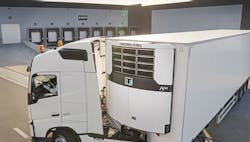St. Patty's Day Greening: Irish-based Trane approves use of HVO in Cold Chain Transport
What’s a St. Patrick’s Day without a story about an Irish company trying new things to be greener, right?
Global HVAC firm Trane Technologies this week announced that it has approved hydrotreated vegetable oil (HVO) as a sustainable alternative to diesel fuel in its ThermoKing cold-chain solutions. These include refrigerated truck and trailer lines to move temperature-sensitive goods such as certain foods and medicines.
HVO is a fossil-free fuel made from hydrotreated vegetable oils or animal fats. Other power generation firms such as Kohler are approving and utilizing HVO to fuel generators and reduced carbon emissions, such as a reported 90 percent reduction in greenhouse gas emissions and 30 percent less particulate matter compared to other fuels such as diesel.
“We are excited to now extend the option of HVO to our customers in the Americas who share our passion for creating a more sustainable world,” said Karin De Bondt, president of Trane Technologies’ Thermo King Americas business, said in a statement. “Through our advanced technologies, with efficient, all-electric-units as well as fossil-free fuels, we are enabling our customers to decarbonize as we continue to execute our strategic roadmap to net zero.”
Trane approved the inclusion of HVO among its fuel resources for Thermo King after testing through a pilot project with a national food distributor. Other transport firms such as Spinelli also are moving toward some use of HVOs.
Trane started as an American heating products company in the early 1900s. Ingersoll Rand acquired the HVAC part of the firm in 2008 and moved its corporate offices from Bermuda to the Swords suburb of Dublin.
HVO has previously been approved for Thermo King truck and trailer products operating in Europe, Middle East and Africa, and Asia Pacific. The fuel is also used for unit testing on all assembly lines and customer units at the company’s manufacturing facility in Galway, Ireland.
Thermo King has also committed to delivering all-electric, zero-emission solutions for every segment of the end-to-end cold chain by 2023 in Europe and 2025 in the Americas.
Thermo King is well known globally as the equipment for cold-chain transport. Its cargo included crucial Covid-19 vaccines delivering to pharmacies and medical facilities during the pandemic.
Other Irish-based global firms which are promising to cut greenhouse gas emissions in coming years, and have already made the road rising to meet that goals, include Accenture, CRH, Eaton, Johnson Controls and others.
-- -- --
(Rod Walton, senior editor for EnergyTech, is a 15-year veteran of covering the energy industry both as a newspaper and trade journalist. He can be reached at [email protected]).
Follow us on Twitter @EnergyTechNews_ and @rodwaltonelp and on LinkedIn
About the Author
Rod Walton, EnergyTech Managing Editor
Managing Editor
For EnergyTech editorial inquiries, please contact Managing Editor Rod Walton at [email protected].
Rod Walton has spent 17 years covering the energy industry as a newspaper and trade journalist. He formerly was energy writer and business editor at the Tulsa World. Later, he spent six years covering the electricity power sector for Pennwell and Clarion Events. He joined Endeavor and EnergyTech in November 2021.
Walton earned his Bachelors degree in journalism from the University of Oklahoma. His career stops include the Moore American, Bartlesville Examiner-Enterprise, Wagoner Tribune and Tulsa World.
EnergyTech is focused on the mission critical and large-scale energy users and their sustainability and resiliency goals. These include the commercial and industrial sectors, as well as the military, universities, data centers and microgrids. The C&I sectors together account for close to 30 percent of greenhouse gas emissions in the U.S.
He was named Managing Editor for Microgrid Knowledge and EnergyTech starting July 1, 2023
Many large-scale energy users such as Fortune 500 companies, and mission-critical users such as military bases, universities, healthcare facilities, public safety and data centers, shifting their energy priorities to reach net-zero carbon goals within the coming decades. These include plans for renewable energy power purchase agreements, but also on-site resiliency projects such as microgrids, combined heat and power, rooftop solar, energy storage, digitalization and building efficiency upgrades.

